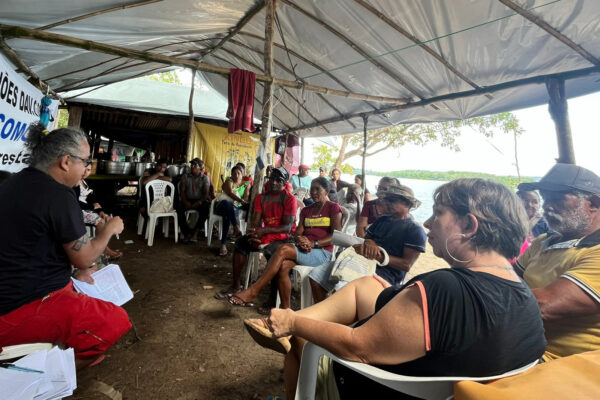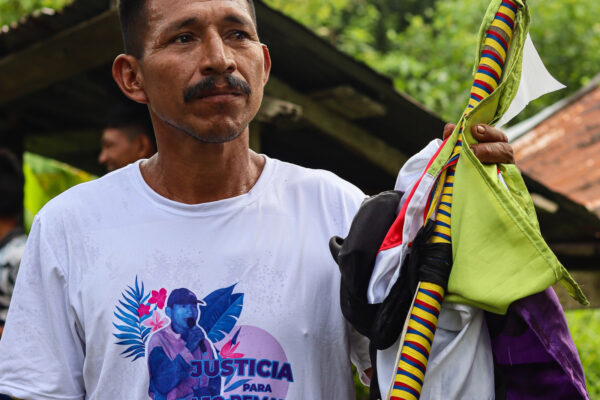International Verification Mission on the Human Rights and Humanitarian Situation for Indigenous People in Colombia
Verification Commission to Arauca
The verification commission responsible for visiting eastern Colombia was made up of representatives from Inter Pares (Canada), CONAIE (Ecuador), Sarayaku Delegation (Ecuador), Human Rights Everywhere (Norway), Amazon Watch (USA), Native Women’s Association of Canada (Canada), Zurich daily newspaper (Switzerland), the European Network for Solidarity with Colombia, Friends of the Earth Latin America and the Caribbean – CENSAT (Colombia), Humanidad Vigente (Colombia), ONIC (Colombia) and the Hemera Foundation (Colombia).
Routes
The mission met with the Uwa Community (in Playas de Bojabá), the Guahiba Community (in Betoyes) departmental and municipal authorities in Arauca (in the offices of the Unión Sindical Obrera, USO, the Oil Workers Trade Union), and the Matacandela Community (in Arauca)
Observations from the field
1. The armed groups present in the region (Colombian state army, guerrilla, State police, emerging groups, and paramilitaries) have been actors in an armed conflict which has been raging for many years, and are responsible for the following actions carried out against indigenous communities:
o Murder of indigenous leaders and community members, thus provoking social disintegration within communities;
o Continuous smear campaigns accusing indigenous people of belonging to the guerrilla or other illegal armed groups, leading to indigenous people being unable to move freely within their own territories.
o Threats and arbitrary detentions of members of the indigenous community in general.
o Occupation of, and placing anti-personnel landmines within, indigenous territories.
2. According to testimonies in the field, State military armed forces have used schools, halls, and other community spaces, to camp out during military operations, thereby violating international humanitarian law.
3. The Mission heard ongoing reports from indigenous people of violations to their constitutional right to move freely within their territories and travel to municipal capital towns.
4. The Mission received worrying reports of arbitrary detentions, mainly affecting leaders and young people due to their lack of identity papers.
5. The Mission views with extreme concern the pressure placed upon indigenous women and adolescent girls to have sexual relations [with members of armed groups], causing serious problems such as single motherhood and sexually transmitted diseases; which as a result has caused the rejection of these same women by their own communities.
6. The recruitment of young people has been an ongoing practice in the region (involving minors in the majority of cases) into the ranks of the State armed forces, and into guerrilla and paramilitary groups, disrespecting indigenous culture and the legal conditions which exempt indigenous people from military service.
7. The terror caused by the actions of the different actors in the conflict has been a recurring factor in the lack of timely denunciations by indigenous people regarding the attacks of which they have been victim. In addition, the process of denunciation is not practical, whether though the State Human Rights Ombudsman’s Office (Defensoría) or the Municipal Human Rights Liaison (Personería), since the victims are always required to appear before a military judge for further information; and sometimes within the military bases themselves. In general, indigenous people feel a lack of guarantees to be able to denounce crimes against them.
8. The Mission also heard denouncements related to the forced eviction of families and other groups within the community, after false accusations and smear campaigns from army informants. As a consequence of this practice, on many occasions the State security forces free indigenous people only to arrest them again at a later stage, ignoring their right to habeas data.
9. Indigenous people targeted in these illegal practices are subsequently stigmatized and become the victims of attacks and threats from paramilitary groups.
10. The Mission received reports of the use of indiscriminate force during military operations against the civilian population.
11. The community of Betoyes denounced to the mission that the government body responsible for assisting the internally displaced population in Colombia, Acción Social, has not fulfilled the agreed promises for the return of the victims of forced displacement to their territories.
12. The Government body responsible for rural development, INCODER, has been slow to fulfil its promises for the official enlargement of indigenous territories, as in the case of the Matacandelas indigenous territory in the Arauca area.
13. The Mission observes that the process of prior consultation has been characterized by problems related to language, limitations in the assignment of a suitable adviser to work with the communities, and the segmented nature of the process (for either territorial or organizational reasons), and other elements related to the development of the process.
14. The mission is concerned about the constant racism at both the institutional and individual level, embodied in various public servants who discriminate against members of indigenous communities.
15. This phenomenon can also be observed in some educational institutions, which discriminate against indigenous children and young people, mainly from the Guahibo ethnic group, forbidding them to speak in their language within the schools.
Response of the civilian and military authorities
16. In the same vein, the Mission is extremely concerned at attempts by some public servants to hide the lack of public policy in favour of indigenous people, under the pretext that indigenous peoples’ problems are related to personal quarrels or disobedience to indigenous authorities, among other reasons due to alcoholism.
17. While bearing the above in mind, the mission also observed with concern the deterioration of community life due to alcoholism, in both women and men, which has brought with it as an immediate consequence, the maltreatment of women and children and abandonment of children in town centres.
18. The response of the State security forces to the denunciations presented by Indigenous People and by the Mission was surprising, since they stated that these claims were unfounded, and that they had never before received complaints relating to the violations described above. The Mission received no response to the claims made by indigenous people. The members of the State security forces responsible for the region stated that they were all new in their posts.
19. In the same way, the subject of the sexual harassment of women was dismissed as natural in relationships between men and women, which as such cannot be remedied.
20. Contrary to the Mission and the spirit with which the National Human Rights Ombudsman’s Office (Defensoría del Pueblo) has carried out its defense of indigenous peoples, the Mission noted the negligent attitude of the public servant from the Regional Ombudsman’s Office, who did not greet the Mission or the accompanying indigenous delegation, and who spent the few minutes she was present in the meeting, talking on the telephone, only to leave the meeting shortly afterwards without formally excusing herself. Although the delegate from the Public Inspector’s Office (Procuraduría) stayed a few minutes longer, he also left without explanation.
21. In short, the participation of the different government offices did not fulfil the expectations of the communities, and their response shows the value afforded to indigenous issues within the country.
22. The Mission would like to highlight the fact that, despite their responses, the members of the state security forces (army and police) stayed throughout the meeting and gave answers to all the questions raised by the Mission and the Indigenous communities, as well as agreeing to a bilateral meeting with the ONIC and ASCATIDAR to cover in greater detail the denunciations presented.
23. Both the state and the indigenous communities must involve professional indigenous people in the different processes according to their expertise, since they are interpreters and authoritative spokespeople on their communities.
Recommendations
1. That the State security forces approach indigenous people so as to improve communication channels, and deal more effectively with denunciations related to threats, displacements, intimidation and other human rights violations.
2. Develop effective and workable mechanisms and strategies so that indigenous people can denounce violations carried out against them.
3. The state must cover the costs of indigenous participation in prior consultation processes, as well as guarantee that all discussions are held autonomously and free from any coercion whatsoever.
4. Prior consultation must be carried out in the indigenous peoples’ own languages, and the necessary translators must be provided if a different language is used.
5. The consultation must guarantee the participation of all community members through the representation mechanisms provided for within all communities.
6. The State must respect the wishes of the U´Wa people, to involve the communities from all 5 affected regions in the consultation process.
7. The State must guarantee that the U´wa People have ongoing access to a qualified adviser, chosen by the community, to accompany them throughout the entire process.
8. Many of the denunciations presented are the result of an absence of specific programmes for indigenous communities, related to their economic, social and cultural rights. For this reason, the state must implement differential programmes at all levels for these communities, and at the national level they must implement differential public policy, in order to find a real solution to their problems.
International Verification Mission
Arauca Working Group
September 21 – 23, 2006













